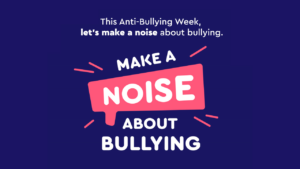Anti-Bullying Week, coordinated by the Anti-Bullying Alliance, is an annual event aimed at shining a light on bullying, whilst providing valuable resources and advice. Established in 2004, it has always been driven by a particular theme such as cyber bullying, or instilling respect and acceptance. The theme for 2023 is ‘Make A Noise About Bullying’, which was also the theme back in 2015. We think that this is a particularly effective theme.
What does making a noise about bullying mean?
This theme was born out of consultations with pupils and teachers, who wanted a theme to empower those who have been a victim of bullying.
Making a noise about bullying is about encouraging people to not be silent about bullying and the harm it can cause. The many ways people can make a noise is:
- Reporting bullying as quickly as possible should you be a victim of it
- Reporting bullying should you be a witness to it and, if possible, show allyship to victims
- Opening general discussions about bullying
Making this noise can be done face-to-face and online, in schools and workplaces, and within the home. In fact, the more widely we can talk about bullying, the more likely we are to put a stop to it.
Why is it a potentially effective campaign?
Before we look at why we think the 2023 theme is an effective one, we need to look at the prevalence of bullying. According to the Anti-Bullying Alliance, 40% of young people were bullied in the last 12 months, with 6% experiencing bullying on a daily basis. Sadly, 24% of bullied children were more likely to be kept off school by their parents. Bullying still remains a huge problem.
Many themes previously used by the Anti-Bullying Alliance have been centred around changing the attitudes of the perpetrators of bullying. Whether this has been a focus on diversity, acceptance and individuality – or simply being kind and respectful, its approach has been to target those who bully others. Whilst it remains important to re-educate and engage those that bully, these messages are not effective enough. At least not in the short term. The call to action for 2023 is firmly focused on giving victims and witnesses of bullying a voice and empowering them to take control of the situation – potentially dealing with bullying in real time, as it happens.
The sooner bullying is dealt with, the more chance there is of its long-term effects being avoided. Many adults who experienced bullying as children reported significant issues such as mental health problems, obesity connected with low self-esteem, and difficulties in forming long-term relationships. Read more in our Bullying: why tackling it early could limit the damage article.

Bullying and care-experienced young people
There should not be a stigma attached to anyone in care, but unfortunately many care-experienced young people have experienced some form of bullying. For this reason, many seek to hide the fact that they are currently in care for fear of victimisation from peers.
One of our young people who had experienced bullying at school told their foster carer about it. The foster carer then immediately petitioned the school for it to be dealt with. Not only did the school deal with it appropriately, but a special assembly was presented in order to educate pupils about how wrong bullying is and the harm it can cause.
Another one of our care-experienced young people reported that it was difficult for her to hide the fact that she was fostered because of differences in ethnicity between her foster carers and herself: “It was always a worry for me as my foster family are of a different ethnicity, therefore it was more obvious that they were not my biological family. Sometimes I would choose to stay home in case someone was to see me with them and wonder who they were. Or worse. Figure out that I was in care.”
However, she made a positive decision when she started university: “I made new friends and began developing as a person. I decided that I was proud to be a care leaver and if anyone had issues with that then I would stay away from them and continue friendships with people who did not judge me based on my background of being in care. The new friends I made saw me for me and did not react negatively; in fact, they were very intrigued by the care system and asked questions in a respectful way.”
This is what making a noise about bullying looks like, and this is what it can achieve. We need organisations such as schools and workplaces to continue to open dialogues and create safe and proactive spaces to enable those affected to speak up and report bullying, without fear of retribution or further victimisation.
Let us continue to make that noise.
Read more about ‘making a noise about bullying’.
#AntiBullyingWeek #MakeANoise



